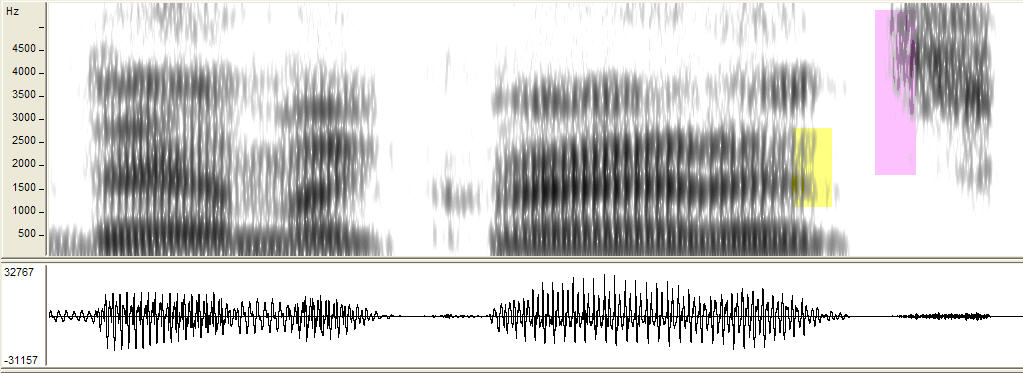June 07, 2007
"Republicans and Democratics": Hypercorrection or speech error?
Or could it be both? Don Porges writes:
We may have achieved some kind of back-correction (if that's a word) in the issue of "Democrat" vs "Democratic"... If my ears do not deceive me, you can hear Tom Ashbrook of WBUR's On Point refer to the people themselves as "Republicans and Democratics", 30:52 into the June 6, 2007 show "Republicans Debate: Round 3".
Or it may be a weird stutter, "Democrat-ats". Hard to tell. Bring out the waveforms!
Don's first idea, I think, is that Ashbrook might be using "Democratic" in place of "Democrat" as the noun form, as an over-reaction to all the complaints about Republicans who use "Democrat Party" and similar phrases as a taunting insult to their political opponents (see "'Democrat majority': offensive but not ungrammatical", 1/31/2007).
This particular sort of error is generally called a "hypercorrection". At least, that term almost fits. Usually the source of a hypercorrection is someone who doesn't know any better. In one common sort of hypercorrection, for example, a speaker whose dialect has lost a distinction that is maintained in higher-prestige forms of the language may sprinkle the missing forms around indiscriminately, in an attempt to seem posh. James Thurber satirized this process in his Ladies' and Gentlemen's Guide to Modern English Usage:
The number of people who use "whom" and "who" wrongly is appalling. The problem is a difficult one and it is complicated by the importance of tone, or taste. Take the common expression, "Whom are you, anyways?" That is of course, strictly speaking, correct - and yet how formal, how stilted! The usage to be preferred in ordinary speech and writing is "Who are you, anyways?" "Whom" should be used in the nominative case only when a note of dignity or austerity is desired. For example, if a writer is dealing with a meeting of, say, the British Cabinet, it would be better to have the Premier greet a new arrival, such as an under-secretary, with a "Whom are you, anyways?" rather than a "Who are you, anyways?"
Another example of this kind is the sometimes-satirized behavior of Cockneys who add [h] in front of vowel-initial words, in an ironically self-subverting attempt to avoid being stigmatized for h-dropping:
NOCKY tells me that the Westry means a-clearin' hout our place
For to make a bit o' garding, wot they calls a Hopen Space,
An example that became conspicuous a few years ago is the pronunciation of Jaguar as if it were written "jagwire". I speculate that this originated in a (south midlands?) dialect that merges the pronunciation of words rhyming with fire with that of words rhyming with far. Some speakers of this dialect noticed that city slickers often pronounce -ar words with -ire, and recognized that the failure to do so is stigmatized, a marker of "redneck" speech patterns.. Since "Jaguar" is the name of a prestige automobile, you naturally don't want to use a stigmatized pronunciation. So you pick the prestige variant that your dialect lacks -- and paradoxically, you thereby create a stigmatized hypercorrection, just as the cockney speakers do by adding a random initial [h].
(This analysis is purely a guess on my part -- if you know any research into the distribution and history of jagwire, please let me know. And how did this wind up as Steve Jobs' pronunciation for the code name of OSX 10.2? Okie influence on northern California speech patterns?)
OK, back to Ashbrook and his "Republicans and Democratics". It would be neat if he had been so concerned to monitor for using Democratic instead of Democrat as a modifer, that he mistakenly used Democratics as a substantive.
The trouble is, as Don acutely observed, Ashbrook didn't say "Democratics", but rather something that you might spell "Democratits". For determining the place of articulation of consonants, ears are still the best instruments we have. So give a listen:
It's clear that the D-word has four syllables, not three; but it also does sound like it ends in "-its" rather than "-ics". (That would be IPA [ˌdɛ.məˈkræ.ɾɪts] instead of [ˌdɛ.məˈkræ.ɾɪks] ).
If you want the added comfort of instrumental science, here's the requested waveform, and more to the point, a wide-band spectrogram of Ashbrook's pronunciation of the D-word:

The fact that there's no [k] articulation is signaled in the spectrogram by the lack of a "velar pinch" in the closure of the final syllable, highlighted in yellow, and the corresponding lack of any mid-frequency burst in the release of the stop closure into the [s], highlighted in pink.
So why did Ashbrook say "Democratits"? Beats me -- maybe he started to say "Democratics" and tried to take it back, but it was too late. On this analysis, his initial decision to use "Democratics" would itself be a kind of speech error, caused by the fact that his heightened awareness of the Democrat/Democratic distinction resulted in each form priming the other more strongly than usual; and then he noticed the mistake in midstream and tried to suppress the last syllable, creating a phonetic error on top of the lexical substitution.
That might be the biggest load of speculative association piled on a one-word error since Freud's Psychopathology of Everyday Life. But just imagine what we'd all be thinking if W had said it. (Cue George Lakoff on stern vs. nurturing...)
[Clarifying the "jaguar" pronunciation options mentioned above: The OED gives the IPA pronunciations [ˈdʒæg.wɑː(r), ˈdʒæg.juː.ɑ(r)], with the parentheses indicated r-ful vs. r-less optionality. I believe that (some of) the American commercials for Jaguar-the-car feature a British voice using the r-less version of the second of these. The "jagwire" pronunciation, in the same style of surface-phonemic IPA, would be something like [ˈdʒæg.waɪr].
Posted by Mark Liberman at June 7, 2007 05:57 AM